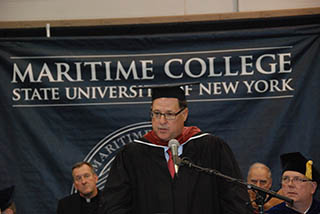Before State University of New York Maritime College cadets had their midwinter graduation Jan. 29, some of them had trained on the Bouchard Tug and Barge Simulation Center – a $750,000 virtual tugboat, tucked into one of the old gun casements of Fort Schuyler.
Morton Bouchard III speaks at SUNY Maritime graduation on Jan. 29, 2016. Kirk Moore photo.At graduation, they heard Morton Bouchard III, president and CEO of Bouchard Transportation Co., Melville, N.Y. (the company that made the simulator possible), talk about the philosophy and principles that helped the fourth-generation family business grow into the nation’s largest privately held fleet of oceangoing petroleum barges.
Bouchard, a 1980 graduate of Ohio Wesleyan University, was presented with an honorary doctorate degree from SUNY Maritime in recognition of his support for maritime education. Bouchard’s formula for business success was simple: Always, he said, the family reinvested profits.
They stuck to that strategy when things looked ugly, with the passage of the Oil Pollution Control Act of 1990. Drafted by Congress and signed by President George H.W. Bush in the aftermath of the Exxon Valdez disaster, the new law mandated double hulls for oil vessels, and potential criminal liability for accidents.
“I fought vigorously down in Washington for a year and a half” on behalf of the industry, Bouchard recalled. When advocates for OPA '90 prevailed, his father Morton S. Bouchard Jr. “wanted to get out. He was more concerned with the criminal liability our crews would face.”
Father and son had a dinner sit-down, where the younger Bouchard argued for embarking immediately on a double-hull construction program. His father. Bouchard said, “looked at me like I had five eyes.”
But the decision was made to go ahead, and not long after that, the younger Bouchard was named company president at age 32. Today, the Bouchard fleet numbers 26 double-hull ATBs, and Bouchard says the law “had a positive impact on safety.” Safety is a priority for Bouchard operators and must be for the whole industry, Bouchard stressed.
“Do not allow anyone, and I mean anyone, an owner, a captain…make you perform a task you feel is unsafe,” he said.
At Bouchard the policy is no second-guessing, and “if anyone gives [employees] a hard time, they are to call me directly,” Bouchard said.
“There are a lot of people out there who would like to put the petroleum transport business out of business,” he added. “We need your help.”




